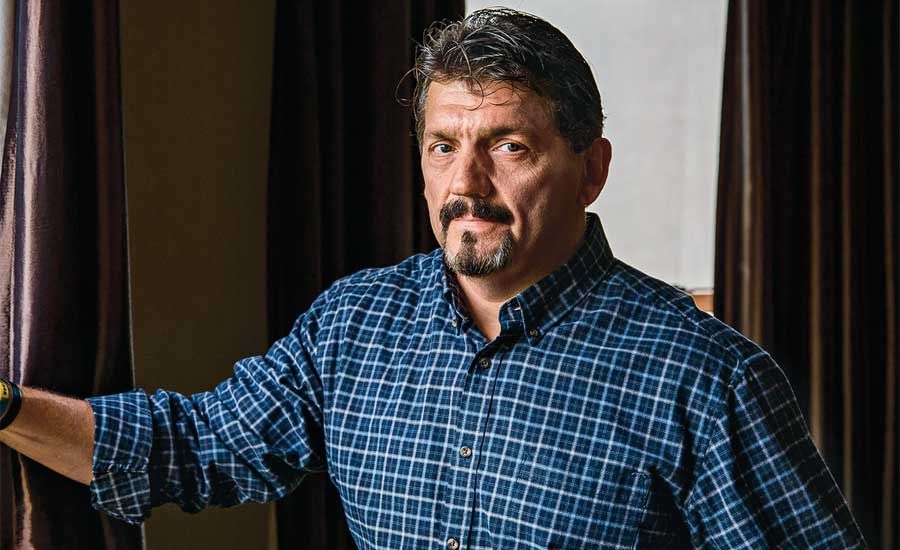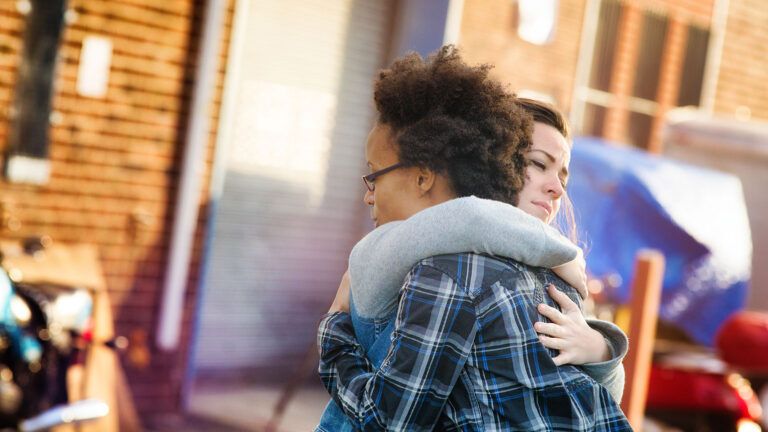My son Tyler stood in the kitchen that Thursday night drinking a tall glass of milk. “It’s great to be home,” he said. He looked like his old self, his face filled out, his eyes clear, a light in them that I hadn’t seen in a long time. We’d finally been able to get him the help he’d needed, thank God.
“I think you could play ball again,” I said. He was only 23.
Tyler laughed. “I’m done with football, Dad,” he said. “I want to go back to school to be a therapist, to help people like I’ve been helped.”
He’d just been released from a 30-day stay at Glenbeigh, the drug-treatment center run by the Cleveland Clinic. This time he was taking it seriously. He’d gone straight to a 12-step meeting, just as he was supposed to.
FOR MORE INSPIRING STORIES, SUBSCRIBE TO GUIDEPOSTS MAGAZINE
“Terrific,” I said. “I’m glad you’re making plans. In the meantime, you wanna help me coach? We’ve got practice at seven a.m. tomorrow.”
“I think I’ll sleep in,” he said. “But count me in for Monday.”
He gave my wife, Christy, and his two younger brothers, Ryan and Alex, big hugs. “I love you,” he said. We all went to bed with a sigh of relief. I slept through the night for the first time in ages.
Before I left for practice the next morning, I looked in on each of the boys, something I’d done since they were babies. I loved seeing how peaceful they were, knowing they were okay. Tyler’s door was locked. I didn’t think anything of it. In treatment he was up every day at six. He had to be bushed.
It was a 30-minute drive to the high school where I volunteered as an assistant coach. As the miles rolled by, my mind rolled back through the last three years. I’d been thrilled when Tyler told us the University of Akron Zips would give him a chance to join the football team. He was passionate about everything. Football, especially.
I liked to think he’d gotten that intensity from me. My day job was in corporate sales for FedEx, a position I excelled in. But it was football—I’d played in college—that taught me perseverance and teamwork, showed me that hard work and toughness could beat raw talent. Things I wanted Tyler to know.
He was the son I never worried about. A good student, active in church, with tons of friends. I watched him run onto the field with the Zips for the first time in the fall of 2007, my chest swelling with pride. By his sophomore season, Tyler was a starting defensive back and had won a scholarship.
READ MORE: THE CANDLE THAT ANSWERED A PRAYER
The first game, against Wisconsin, he had 18 tackles…playing with a pulled hamstring. He was unstoppable. He finished the season as one of the team’s leading tacklers. But all those hits took their toll.
That January, in 2009, he had shoulder surgery. Everything went well. The surgeon assured Tyler he’d be ready for spring practice and sent him back to his apartment with a prescription for 60 Vicodin. “There’s likely to be some lingering pain,” he said.
It wasn’t until halfway through Tyler’s junior year that we realized something was wrong. He was calling every few weeks asking for money. His grades dropped. On the field, he was making mental errors, missing tackles. Christy and I took him to a therapist, who talked to him for more than two hours.
“Your son has a serious opiate addiction,” the counselor told us. “You need to get him into a treatment program immediately.”
In disbelief, we confronted Tyler. He told us his teammates shared painkillers like they were candy. “Everyone’s taking them,” he said. “It’s no big deal. I need them to play football.”
We knew how much he loved the game. It wasn’t as if he was some junkie. We got him into a six-week outpatient program. After four weeks he seemed back on track. The spring semester was starting, not to mention spring practice. We agreed it was best for him to leave treatment and return to school.
I hadn’t told a soul what was going on. Even though I didn’t think of Tyler as an addict, it still seemed shameful, a failing on my part. Good Christian families didn’t have children going to drug counseling.
Just a few weeks later, the new Zips coach called to say Tyler was skipping classes. I was furious. Tyler came back home and completed the six-week program only to find out that the university had revoked his scholarship for leaving school to get treatment.
He enrolled in community college and got a job doing construction. But it was as if his life had no meaning without football. He was moody and withdrawn. Nothing we did helped. I accused Christy of being too easy on him. The tension grew until we were all barely speaking to one another.
Over the next year, Tyler’s muscular frame turned gaunt. He admitted he needed help. We put him in other treatment programs, but he always relapsed. He started seeing our pastor for counseling. Christy and I were praying. Why wouldn’t God give us the answer?
Stay Positive With These Inspiring Books
Then, we were going through Tyler’s room when something stopped me cold. Peeking out from under a pile of clothes were some balloons with a white powdery residue. Heroin. We’d read enough online to know what it was. Heroin killed people. This was an emergency.
I made dozens of calls to treatment centers, but none had an opening. Every day I called back, praying that nothing would happen to Tyler while we waited. Finally a counselor at Glenbeigh said, “If you can get him here today, I’ll make sure there’s a place for him.”
It felt like God had opened a door. Tyler responded almost immediately to the strict regimen, the counseling, the group therapy sessions. I could see the difference when Christy and I visited on weekends.
Now, at last, Tyler was home, and everything could get back to normal.
I pulled into the parking lot at the practice field and hopped out of the car. The players started their warmup. My phone rang. I didn’t even look at the screen. It couldn’t be that important.
But my phone kept ringing. Finally I answered. It was Alex, my youngest. “Mom can’t wake Tyler. She thinks he took drugs.” I could hear Christy crying in the background.
“Tell your brother to call 911,” I said. “I’m coming home right now.” I ran to the car. Before I’d even started the engine, Ryan, my 18-year-old son, called.
“Dad, it’s too late,” he said. “Tyler’s dead. They can’t save him.”
“I’ll be there in twenty minutes,” I said. “I’ll fix it.” I hung up, and only then did the reality hit me. I couldn’t fix it. I would never see the light in Tyler’s eyes again. There was nothing more I could do for him. It felt like my whole world was crashing down.
Our street was lined with cars—sheriff’s deputies, paramedics, the coroner. I ran inside, to Tyler’s room. A deputy blocked the door. “I’m sorry, sir, I can’t let you in right now,” he said. “This is a crime scene. There was a spoon and a syringe on your son’s desk. It appears he overdosed on heroin.”
Choking back tears, I turned and looked for Christy. We held each for what seemed like forever. All I could think about was how I’d failed Tyler. Why hadn’t I searched his room last night, questioned him more closely? I should’ve known better.
God, where are you in this? I wondered. How could you let Tyler die just when he was getting his life together again?
The next three days were a blur: writing the obituary, picking out the casket, deciding on the details of the service and the visitation. We found a church much larger than our home congregation for the service, expecting a few hundred mourners. Someone had posted news of Tyler’s death on Facebook.
All this time I’d tried to keep his addiction a secret. Now it was out there for all the world to see and judge him—and us—for it.
Find Hope, Inspiration, and More in our Free eBooks
When we got to the church, an hour before the visitation began, there was already a long line of people waiting outside. For four hours Christy and I stood at the front of the church while 1,500 mourners filed past. I just wanted to get through it and go back home, where I could be alone with my grief, my shame, my guilt.
But the mourners lingered. Every person, it seemed, had a memory of Tyler they wanted to share. Then a man I didn’t know leaned close and whispered, “I know some of what you’re going through. My daughter’s addicted to heroin.” A short while later, a woman said, “I have a sister who’s in treatment for pain pills.”
It kept on like that. Person after person, at least 50 of them, telling me about loved ones battling addictions. Slowly their words sank in. I wasn’t alone. Far from it. Good, wholesome suburban Ohio families ravaged by addiction. How many must there be in our town? In all of Ohio?
Long after Tyler’s service, the compassion and love people had shown our family stayed with me. God’s love. Sustaining me. Strengthening me. Drug addiction was nothing to be ashamed of. It was like cancer, a disease no one was immune to.
Battling it in secret only made it more powerful. We needed to be open about it, to be there for each other. That was the only way to beat it. Not that I had any idea of how to do that. All I wanted was to spend time with Christy and the boys, to let ourselves heal. FedEx had told me to take as much time off as I needed.
One day a friend invited me to a meeting of 12 concerned dads. They wanted to do something to honor Tyler. Reluctantly, I went.
The men threw out all kinds of ideas. A golf tournament. A vigilante squad to go after drug dealers. “None of this is going to help,” I said. But we kept meeting and eventually someone suggested going into the schools and telling Tyler’s story. That’s how our foundation, Tyler’s Light, started.
I left my job to devote myself full-time to raising money for drug education and awareness and talking to students. It’s still hard for me to talk about losing my son, but in the four years since his death, I’ve made presentations to more than 100,000 kids.
You might say it’s atonement, but it is more about empowerment. I couldn’t save Tyler, but I want to do my best to help save other kids from addiction, to keep other parents from going through what Christy and I have. As Tyler said on his last night, to help people the way I’ve been helped.
For more inspiring stories, subscribe to Guideposts magazine.






